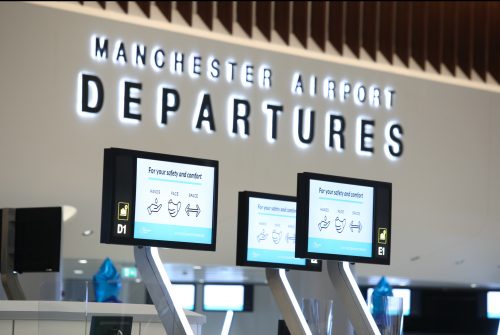Manchester Airport announces pioneering plans for direct hydrogen fuel pipeline

Manchester Airport aims to become the first UK airport with a direct supply of low carbon hydrogen fuel.
It has announced a partnership with HyNet, one of the UK’s leading Government-backed industrial decarbonisation projects.
The airport has signed a Memorandum of Understanding (MoU) with the two founding partners of HyNet – Progressive Energy, which develops projects to decarbonise the energy sector, and Cadent, which will builds and operates HyNet’s hydrogen pipeline network.
Through the MoU, the partners are aiming to deliver hydrogen to the aviation sector at the earliest opportunity, including through the connection of Manchester Airport to a pipeline being developed by HyNet.
The announcement has been backed by Aviation Minister Baroness Vere and Energy and Climate Change Minister Graham Stuart, as well as the Northern Powerhouse Partnership and North West Hydrogen Alliance.
Hydrogen technology will play a key role in decarbonising the aviation sector with hydrogen-powered aircraft expected to come into operation from the mid-2030s for short-haul journeys. A research project conducted by FlyZero involving Manchester Airports Group (MAG) estimated that the demand for liquid hydrogen at an airport the size of Manchester could be 6.5 million litres a day by 2050.
HyNet brings together the technology and infrastructure needed to move the region rapidly to a zero carbon future, including producing low carbon hydrogen that can be used to power aircraft of the future. As a result of the MoU signed today, the partners will work together to assess the future demand for hydrogen for aviation and explore the feasibility to connect Manchester Airport to HyNet’s regional network.
Chris Woodroofe, Manchester Airport managing director, said: “This announcement demonstrates the meaningful action we are taking to ensure we can deliver a carbon-free future for the aviation industry.
“The partnership between Manchester Airport and HyNet is a significant step forward for the future use of hydrogen across the North West, building a more sustainable future for the region.
“By securing a direct supply of hydrogen for our airport, our 60 airlines will be able to make use of this exciting and ground-breaking technology as soon as possible. The use of hydrogen will make a significant contribution to the UK aviation sector’s decarbonisation efforts and supports industry partners in reaching net zero.”
Chris Manson-Whitton, CEO Progressive Energy said: “HyNet will transform the region by the mid-2020s through delivering low carbon hydrogen produced locally at the UK’s first facilities including Vertex Hydrogen and a range of electrolytic plants. We have a huge level of demand for HyNet hydrogen from across the North West and North Wales from a range of sectors stretching from glass and paper to food and drink to consumer goods.
“HyNet will enable the decarbonisation of industry and transport sectors and, by developing a hydrogen economy, is set to generate a £17bn economic impact for North West England and North Wales, providing a much needed boost for businesses across the region. We are extremely pleased to be working with Manchester Airport to make a significant impact on decarbonising aviation as we all play our part in reaching net zero and combating climate change.”
Prof Joe Howe, chair of the North West Hydrogen Alliance and executive director, Energy Research Institute at the University of Chester, said: “The partnership between Manchester Airport and HyNet is a great example of how hydrogen can play a leading role in delivering net zero ambitions on a monumental scale here in the North West.
“The fact that Manchester Airport could become the first UK airport with a direct supply of low carbon hydrogen fuel is an exciting prospect as we work towards creating a cleaner, greener, more sustainable future for the region.”
Manchester Airport – as part of MAG – has a target to make its own operations net zero carbon by 2038, 12 years ahead of the UK national target and two years ahead of the target set for UK airports in the Government’s Jet Zero Strategy. The use of hydrogen fuel technology will play a pivotal role in aviation decarbonisation, alongside other levers including airspace modernisation and the use of Sustainable Aviation Fuel (SAF).
This announcement on hydrogen technology comes a year after MAG announced its partnership with Fulcrum BioEnergy UK which aims to make Manchester Airport the first in the UK to have a direct supply of SAF from the mid-2020s.








